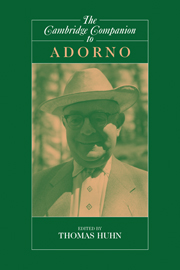Book contents
- Frontmatter
- Introduction: Thoughts beside Themselves
- 1 Negative Dialectic as Fate
- 2 Weighty Objects
- 3 Adorno, Marx, Materialism
- 4 Leaving Home
- 5 Is Experience Still in Crisis? Reflections on a Frankfurt School Lament
- 6 Mephistopheles in Hollywood
- 7 Right Listening and a New Type of Human Being
- 8 Authenticity and Failure in Adorno’s Aesthetics of Music
- 9 Dissonant Works and the Listening Public
- 10 Adorno, Heidegger, and the Meaning of Music
- 11 The Critical Theory of Society as Reflexive Sociology
- 12 Genealogy and Critique
- 13 Adorno’s Negative Moral Philosophy
- 14 Adorno’s Social Lyric, and Literary Criticism Today
- 15 Adorno’s Tom Sawyer Opera Singspiel
- Select Bibliography
- Index
13 - Adorno’s Negative Moral Philosophy
Published online by Cambridge University Press: 28 May 2006
- Frontmatter
- Introduction: Thoughts beside Themselves
- 1 Negative Dialectic as Fate
- 2 Weighty Objects
- 3 Adorno, Marx, Materialism
- 4 Leaving Home
- 5 Is Experience Still in Crisis? Reflections on a Frankfurt School Lament
- 6 Mephistopheles in Hollywood
- 7 Right Listening and a New Type of Human Being
- 8 Authenticity and Failure in Adorno’s Aesthetics of Music
- 9 Dissonant Works and the Listening Public
- 10 Adorno, Heidegger, and the Meaning of Music
- 11 The Critical Theory of Society as Reflexive Sociology
- 12 Genealogy and Critique
- 13 Adorno’s Negative Moral Philosophy
- 14 Adorno’s Social Lyric, and Literary Criticism Today
- 15 Adorno’s Tom Sawyer Opera Singspiel
- Select Bibliography
- Index
Summary
Universalism in moral philosophy has been the source of controversy among theorists in the field for years. One can still acquire a solid view of the ethics debate by sorting out the players according to their acceptance or rejection of universalism. For example, you will find Richard M. Hare, John Rawls, and Jürgen Habermas lined up on one side of the universalism divide, and Charles Taylor, Richard Rorty, and Zygmunt Bauman on the other side, with Martha Nussbaum, Seyla Benhabib, and Alex Honneth poised somewhere in between. What does Theodor W. Adorno have to do with all of this? His reflections about the aporias of the good life (des richtigen Lebens) and rational praxis date from the 1940s to 1960s. They arose in the context of the decidedly nonethical discussions of the old critical social theory. Their crucial theorems do not, at first glance, exactly invite the interest of today's moral theorists. In Minima Moralia, for example, Adorno points out the inner connection between morality and repression. He maintains the thesis that norms and moral principles have, from antiquity to the present, replicated social domination on a theoretical level and that in the false totality of advanced capitalist society the good life is not possible.
- Type
- Chapter
- Information
- The Cambridge Companion to Adorno , pp. 328 - 353Publisher: Cambridge University PressPrint publication year: 2004
- 17
- Cited by

